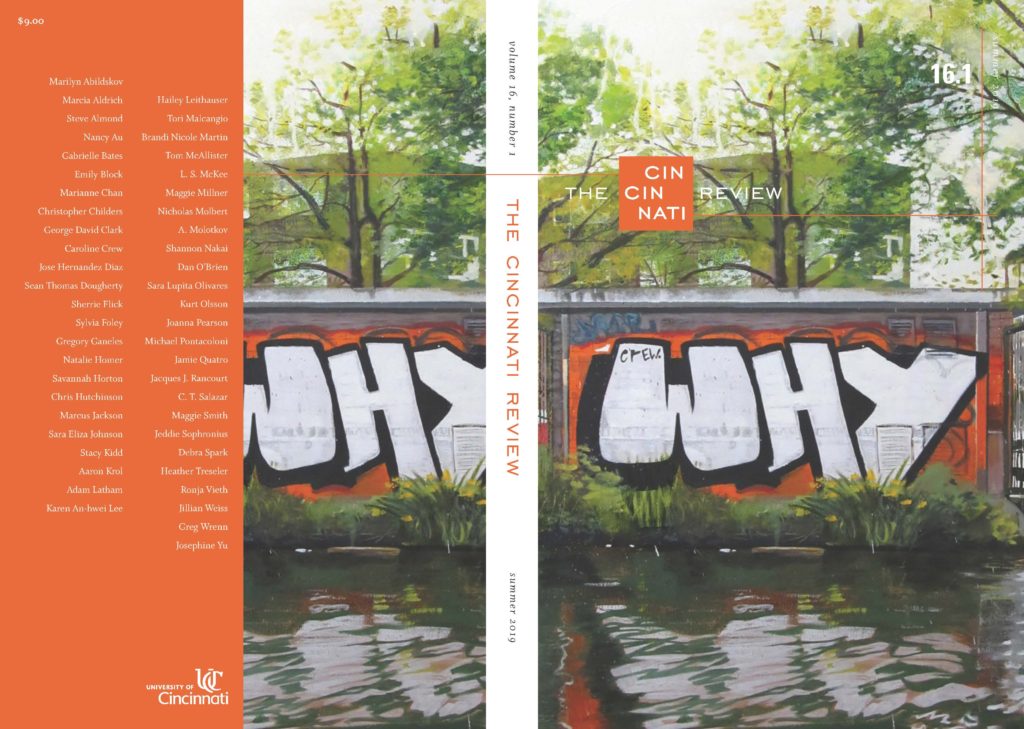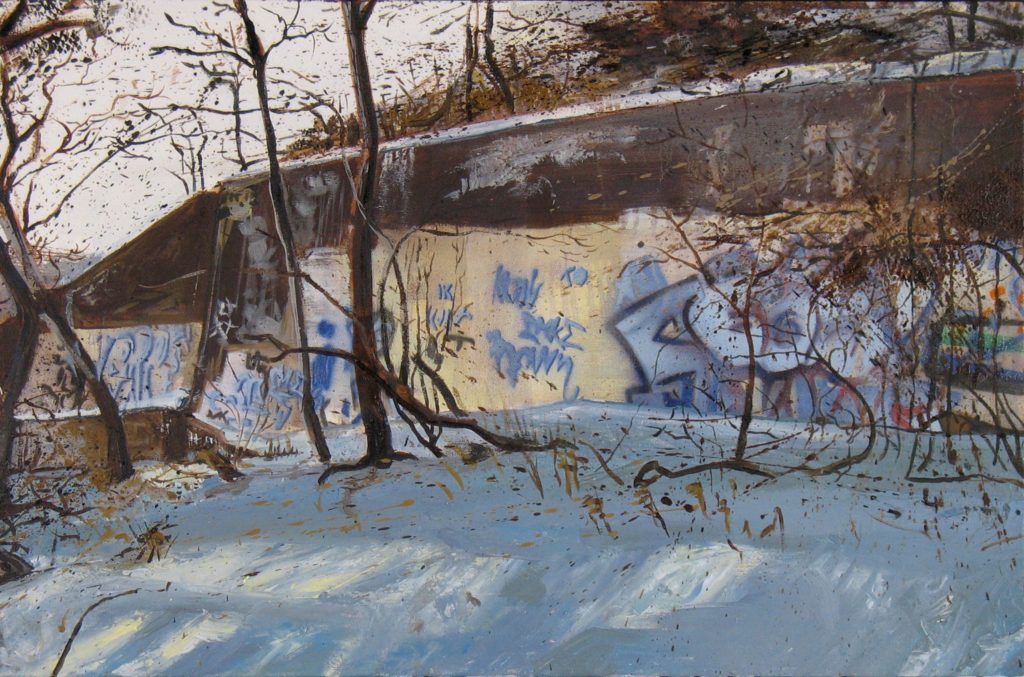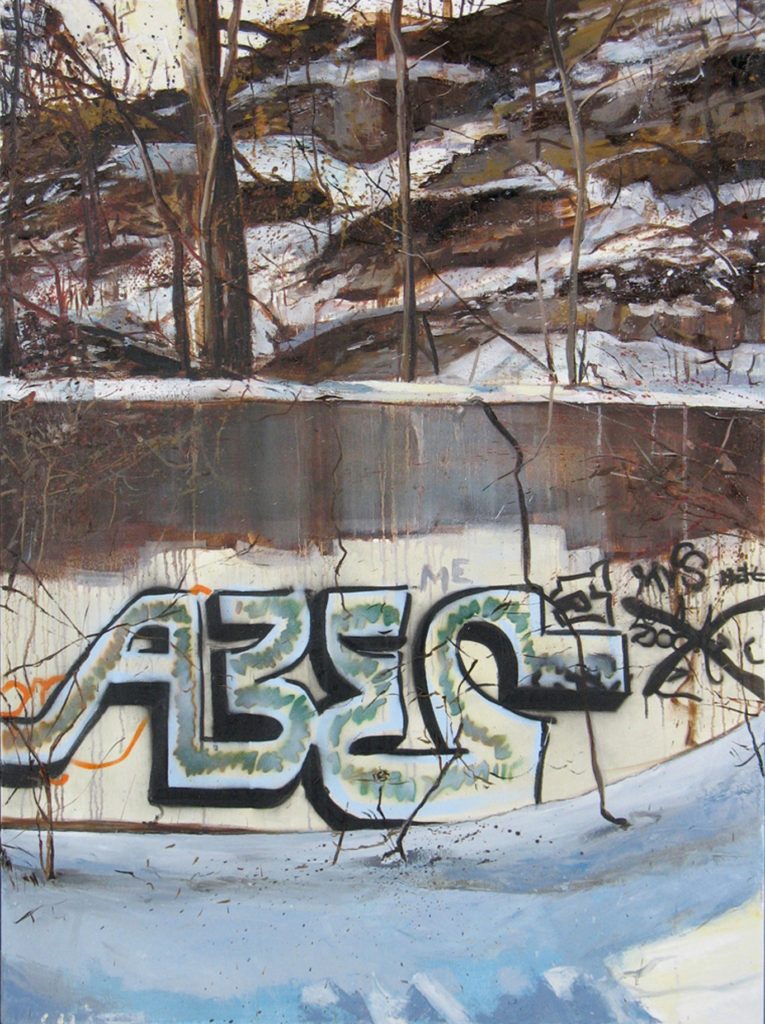Proofreading and Loving Every Minute of It
5 Minutes Read Time

Associate Editor Molly Reid: It’s proofreading time here at The Cincinnati Review, which means we have our colored pencils out and our screens open to The Chicago Manual of Style. It also means we have a chance to do a deep read of the entire 16.1 issue. In addition to the joy of finding errors (which, due largely to the diligence of managing editor Lisa Ampleman and designer Barbara Bourgoyne, are few), proofreading also involves the joy of close attention to language. Reading proofs necessitates going slow, which is something (especially as PhD students) we don’t always have the luxury of doing. Throughout this process of slow reading, there were so many lines that stood out, lines that made us laugh and cry and read out loud to each other. Too many lines to excerpt, but here are a few of the ones that we fell in love with all over again.
Gregory Ganeles’s Artist Statement:
I am fascinated by organic and colorful graffiti that blends in to the natural world. My pieces, layered with drips, spray paint, and splatters, depict a scenario in which graffiti takes over the natural landscape, becoming a part of it.

Dan O’Brien’s play in blank verse, Newtown:
And every teacher knows that in order
to thrive, a student must discover what
they love. And from an early age you loved
guns. Ha ha ha. The first gun I bought you
was an aluminum-alloy Ruger
10/22. You are four and your face
lights up.
Tom McAllister’s essay “Dream Home”:
Inside every wall there is a secret, and every time you expose one, there’s no putting it back.
Savannah Horton’s story “The Shower”:
I had learned a lot about infant development online. I wanted to know what was happening beneath Terra’s skin. Sometimes I shared my findings with her. For example, all babies began life as anuses.
Brandi Nicole Martin’s poem “Moon Aorta Moon Ditch Moon (X)”
I hear the damp thud, the rustle of grass.
Glass packed in skin like both arms barbed
in pure light, and I imagine that, the girl’s
hum wound around a throat mired with soil.
Emily Block’s essay “Fog Studies”:
There is so much possibility in fog: Anything can emerge or disappear in it. Your friends can change. The ones you love can change. You can exchange your most cherished possessions for new things. You will. You will change your memories. You will change your mind and your heart and the wispy edges around it.
Nicholas Molbert’s poem “Novena”:
Our throats felt like throats
just before prayer. Or pleading. Why not say
it seemed that one day he was there,
and the next, he’d been replaced
by a system of supervised holes.
Tori Malcangio’s prize-winning story “See What I Mean”:
Everybody who attempted to play any part of Mom’s unflinching role would fail. But in the kitchen that evening, a piano polka in the background and a good woman’s phone number in the pill drawer, Mom was still with us.
C. T. Salazar’s poem “Triptych Just before Mass”:
Always the awe in hacksawed.
Always the word sanctuary to shave down
like sweet lemon peels.

Greg Wrenn’s poem “The Pieces”:
If there’s ever an Armageddon,
the restored fresco told me, the dead
will reconstitute themselves into glorified bodies—
might I meet yours again
as it bursts from a mausoleum shelf
the size of a microwave,
your ash transmuted
into beard?
Sara Lupita Olivares’s poem “Drawings of a Red-Billed Pigeon”:
we find ghosts of the trees in ways dimming
around themselves to create
indentations of
other selves.
Jeddie Sophronius’s poem “City of Lost & Found”:
It’s no one’s fault if the cartographers
think the number of islands keeps changing.
White cays & rocky reefs appear during low tide,
then sleep with the seahorses under moonlit waters.
Jillian Weiss’s essay “Invisible Man Asshole”:
I was happy to be experiencing the breadth of human emotion, but constantly heartbroken for the kids. With the screen door to my left, I appreciated soft sounds: moth wings slapping lights, cockroaches scurrying over cobblestones, the town’s storied ghosts gliding through the dangling Spanish moss, sending pale green spirals to the ground.
Joanna Pearson’s story “The Films of Roman Polanski”:
When I began to notice things missing from my drawers, items of jewelry replaced with others that were similar yet not the same, photos moved from one spot on the wall to another, I thought to myself not There’s a name for this behavior but rather This is our weirdo love.
See the full table of contents for issue 16.1 here! It’ll be available for order as a single issue in May, or you can order a subscription in our online store now, and we’ll send the issue when it’s out.
